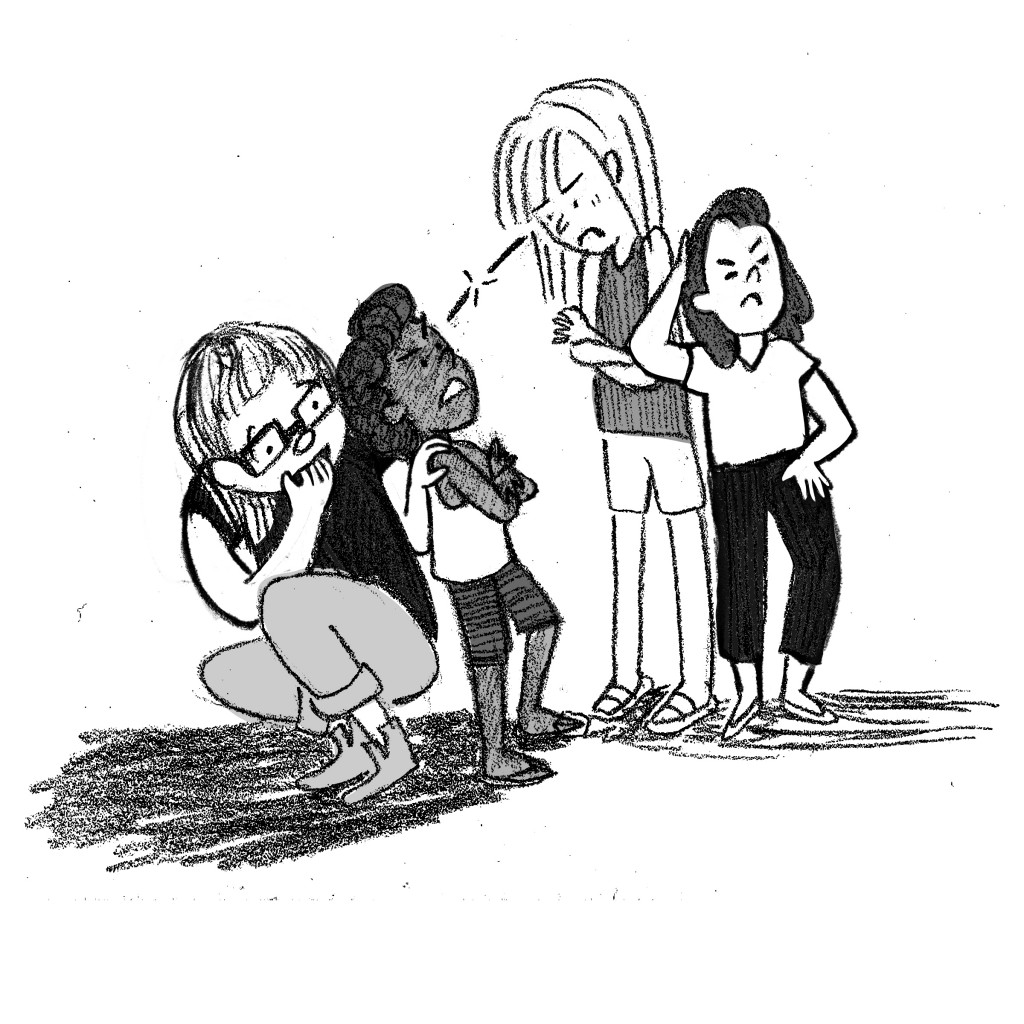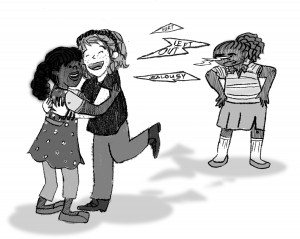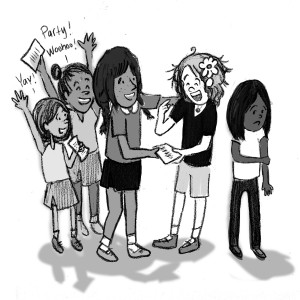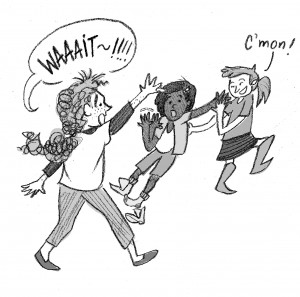|
|
October 9, 2013
I just came off a radio interview on the topic of teen dating violence. (Excellent timing for my Kindness and Respect Challenge. )One of the other guest experts, Associate Professor Emily Rothman of Boston University School of Public Health, said that 10% of teens report having experienced physical violence in a dating relationship. (Hitting, slapping, kicking, sexual coersion, etc.) Apparently that number has been fairly constant over the past 15-20 years. What has been increasing is emotional/psychological abuse in dating relationships. That ranges from name-calling, insults and threats, to dictating what a partner can wear and who s/he can talk to. 25-30% of teens report having experienced emotional/psychological dating abuse. Any controlling behavior (typically on the part of males toward females) is disrespectful. It also frequently leads to physical violence. Because many girls value their close relationships so much it can be hard for them to stand up for themselves and set boundaries.
In this recent email a girl describes to me the disrespectful treatment she gets in a friendship. Substitute the word “boyfriend” for “best friend” and you’ll see we’re talking about a common challenge for teen girls: “How do I get the respect I deserve from the people I care about?”
Hey Terra,
I have a best friend and she’s keeping me in jail. (Well, that’s what I think.) It’s like she won’t let me be friends with anyone or else she’ll be jealous. If she’s jealous, she’ll seek for revenge and I will be miserable and not able to concentrate on my studies. I’ve always wanted to tell her that I don’t wanna be her best friend anymore but I don’t have the confidence to say that. My heart says it’s the best thing to do. Do you think it’s the right decision?
Don’t Wanna Be a Doormat
Dear Don’t Wanna Be,
I agree with your heart. From what you describe, this “best friend” of yours isn’t acting like a friend at all. In your own words she:
• gets jealous if you are friends with anyone
• seeks for revenge
What kind of “friend” is that!?
Do I have to tell you your next best move? Nah. You already know what you need to do. This friendship is not a healthy one. It lacks the key ingredient: mutual respect. This is bullying prevention month. And what’s going on in this friendship is a form of bullying.
You need to end this. I know that is a scary thought. So take some slow deep breaths, right here, right now, and calm yourself. Get your confidence up and say to yourself, “I deserve friends who treat me with respect.” Think it and say it over and over until you can say it with confidence and know that it’s true.
Get to that point and you should be able to say something like this to your friend, “When you try to control who I am friends with by getting jealous and angry at me, I feel like I am in jail. Friends shouldn’t treat each other that way. It’s disrespectful. I’ve been feeling like this for a while but I haven’t told you. Even though I was scared I should have told you. Friends should be able to talk to each other about the hard stuff. I apologize. We don’t seem bring out the best in each other. That is why I am taking a break from this friendship.”
I hope this helps.
In friendship,
Terra
——–
Tune in tomorrow (Day 10) for an update from Don’t Wanna Be a Doormat
*(Excerpted from my upcoming The Girls Q&A Book on Friendship)
UPDATE October 3, 2014: The Girls Q&A Book on Friendship: 50 Ways to Fix a Friendship Without the DRAMA is now available in print and on Kindle (the ebook can be read on any device, your mobile phone, tablet, or computer with the free Kindle reader app). Visit GirlsQandA.com for an excerpt, reviews, and to order your copy.

October 7, 2013
On Saturday (Day 5 of the Challenge) I drove to Stanford to a Challenge Success student event. My job was to lead two round table discussions. The topic: “Too Stressed to Think?” in which I would help tweens and teens understand the link between being in so-called emergency mode and doing stuff we later regret.
I’ve written a lot about stress over the past eight years. Done countless presentations for kids and the adults who live and work with them. Even though Saturday’s event was at a world-class university, teaching doesn’t rattle me. What did shake me up in advance was the challenge of finding exactly where I needed to be. Stanford is a big place and map-reading is not my thing.
Arriving in the vicinity I asked some students for directions to the Graduate School of Education. They wanted to help, but they were newbies and like I said, Stanford is huge. So they kindly brought over this older guy who knew the campus well. He was kind and patient. Helped me decipher my map (yeah, I had one) then told me a) where to park-no charge on weekends! and b) where my building was.
After the event, heading back to my car, I spotted two confused people peering at a map. I asked them if they were lost. They were looking for the campus bookstore. I admitted I was also a visitor, but I wanted to help them. (Pass it forward, right?) Between their map and my knowledge of the name of the building I had just emerged from, we figured it out.
So, take this into the new week: We’re here to help each other. Sure, there are more self-serving ways to play the game, but I don’t recommend them. For one thing, it feels good to help. For another, there’s karma and being helpful will help you. If you need more motivation to go out of your way to help other people, how about this: it’s the right thing to do. Not always easy, as I told the girl who asked this question, but always right.
Got another minute? Read on:
 A girl has bullied me forever. She just got glasses and now people are making fun of her. Should I stick up for her? (from The Girls Q&A Book on Friendship, by Annie Fox, illustrated by Erica De Chavez, © 2014 by Annie Fox and Erica De Chavez. Now available)* What a great question! Isn’t life interesting the way things can turn around? This girl picked on you, so you might be thinking, “Why should I help her?” The answer is simple: Because she needs a friend right now. Another reason you should help is because you know exactly how bad it feels to be teased. If you stand by and let others make fun of her you’ll be unhappy because you’ll know, deep inside, that you could have done something to make things better.
The answer to your question is yes! Stick up for the girl with the glasses. It’s the right thing to do. But you already know that because you’ve got a hero’s heart (otherwise it wouldn’t bother you that people are making fun of her).
If you help her maybe she’ll learn something about the importance of respect and kindness. Then who knows? This may be the beginning of a great new friendship!
*(Excerpted from my upcoming The Girls Q&A Book on Friendship)
Check out Day 8 of The Kindness and Respect Challenge
UPDATE October 3, 2014: The Girls Q&A Book on Friendship: 50 Ways to Fix a Friendship Without the DRAMA is now available in print and on Kindle (the ebook can be read on any device, your mobile phone, tablet, or computer with the free Kindle reader app). Visit GirlsQandA.com for an excerpt, reviews, and to order your copy.

September 26, 2013
Got an email from Concerned Mom whose smart, funny daughter has no trouble making friends, but lots of trouble keeping them. The pattern is this: Daughter gets close to other girls and feels accepted by them. Then, within weeks new found friends exclude and then ignore the girl. Naturally, she feels upset and alone, which, of course breaks Mom’s heart. She turned to me for advice and here’s what I told her:
I understand that it breaks your heart to see your daughter so unhappy. Of course you want her to make real friends who treat her with affection, kindness and respect. But it feels like something is missing in your email.
Each time your daughter is disappointed by a new friend you’ve listened to her side of the story, sympathized and offered comfort and support. All good! But there are at least two sides to every relationship story. That’s why I am curious about what’s going on from the other girls’ perspectives. Maybe you’re also wondering why each of these new friends turn against your daughter after such a short time? It’s a mystery worth exploring.
What might your daughter be doing (knowingly or unknowingly) to contribute to this reaction she often gets? How about if you ask her: “Why do you think ____ stopped wanting to be your friend?”
This question may bring up a lot of emotion, so please ask it in a neutral tone of voice. You’re not accusing your daughter of anything! You’re simply inviting her to put aside her sadness and think about what may be going on here. Right now, she’s hurt and confused and probably feeling powerless. She can regain some of her power by understanding how she functions in friendships because she plays a significant role in every one of them, whether she’s aware of it yet or not. To encourage her to think about that role you need to ask thoughtful, open-ended questions that have no “right” or “wrong” answers. Questions like “Why do you think this girl stopped being your friend?”
Listen to your daughter with an open heart and mind. Try not to interrupt. Initially, she may not say much. She might just shrug and say, “I don’t know.” In which case you might nod understandingly and say, “It’s hard to know why other people do what they do. But we usually have a reason. Your friends have been rude to you. If you could just guess why, what would you guess?”
Your daughter may have fallen into the habit of thinking of herself as a powerless victim to whom other people do unkind things. That’s not a good mental place for her to be. We want our girls to understand emotions (their own and other people’s). We also want them to feel confident in their ability to make and keep real friends. That includes learning to rebound from set-backs and to negotiate the ups and downs of relationships.
I hope this helps.
In friendship,
Annie
*Illustration by Erica De Chavez, from my upcoming The Girls Q&A Book on Friendship
UPDATE October 3, 2014: The Girls Q&A Book on Friendship: 50 Ways to Fix a Friendship Without the DRAMA is now available in print and on Kindle (the ebook can be read on any device, your mobile phone, tablet, or computer with the free Kindle reader app). Visit GirlsQandA.com for an excerpt, reviews, and to order your copy.

April 27, 2013
UPDATE (See end of blog for exciting news about my new book.)
Last month I started working on a new girls’ friendship book with awesome illustrator Erica De Chavez.
If you have a daughter, you don’t need me to tell you that girl friendships can be super complicated and fraught with challenges for girls and their moms! When things get sticky, kindness and respect often go missing in action and feelings get hurt all around.
Since 1997, girls from all over the planet have been turning to me for help in navigating their friendship messes. I guess that makes me an expert on social garbage. The girls who email me are tweens and teens. But I thought, if I write a book to help younger girls, maybe they will have easier friendships when they get to middle school. We can always hope, right? But hope is no strategy for making things better. What our girls need are effective tools for managing conflicts. Combine those tools with the self-respect and social courage to use them… now we’re talking about effective strategies for positive change.
Here’s a sneak peek at the book:
Q: Every time me and my friend have a private conversation, this new girl pulls her away. What do I do??
A: I don’t blame you for not wanting your private conversations interrupted. That’s so annoying! It sounds like the new girl has lots of power, but she doesn’t have all the power. If your friend didn’t want to get pulled away she could tell the girl to stop. She hasn’t done that yet. And you haven’t yet told your friend how you’ve been feeling.
Real friends tell each other the truth. Talk to her. You might say something like this: “I don’t like it when ____ pulls you away from me. How come you let her do that?” Then close your mouth and listen to what your friend has to say.
The next time the new girl tries to yank her away, your friend will either stand up for herself or she’ll let herself be yanked. That’s her choice. One more thing you might think about: Why is the new girl snatching your friend? It’s not always easy being the “new girl” who doesn’t have friends yet. I think that would feel LONELY! She probably just wants a friend and doesn’t know a more polite way to make one. Maybe you and your friend could team up with her and be friends together. That could work!
Anyway, the snatching stuff needs to stop. So talk to your friend. If things don’t change, what are you going do? You can either stand there watching the two of them go off together or you can reach out to other girls and make some new friends. You see, you have choices too!
______________
Sneak peek #2 and sneak peek #3 of the Girls’ Friendship Q&A Book.
UPDATE: July 22, 2014 After a year in production, The Girls Q&A Book on Friendship will be published by Electric Eggplant in September. Just in time for the new school year and the inevitable friendship drama heading toward your 8–12 year old daughter. Every girl needs friendship support from time to time. My book provides that plus:real world advice for navigating through the “social garbage,” friendship quizzes, and advice from older girls about how to be a Super Friend. If you’d like to preorder The Girls Q&A Book on Friendship for a girl in your life, or you’d just like a personal heads-up when the book is available, email me (Connect@AnnieFox.com).
UPDATE: October 3, 2014 It’s here! The Girls Q&A Book on Friendship: 50 Ways to Fix a Friendship Without the DRAMA is now available in print and on Kindle (the ebook can be read on any device, your mobile phone, tablet, or computer with the free Kindle reader app). Visit GirlsQandA.com for an excerpt, reviews, and to order your copy.
 — Older Posts »
| |















